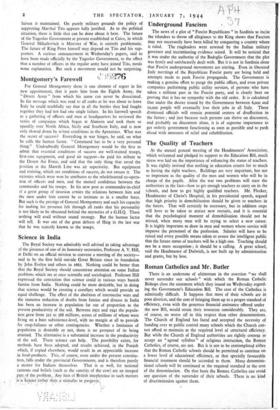Montgomery's Farewell 5276
For General Montgomery there is one element of regret in his new appointment, that it parts him from the Eighth Army, the " Desert Army " from which his name can never be dissociated. In the message which was read to all ranks as he was about to leave Italy he could truthfully say that in all the battles they had fought together they had not had one single failure. In his farewell speech to a gathering of officers and men at headquarters he reviewed the series of campaigns which began at Alamein and took them so speedily over North Africa, Sicily and Southern Italy, and is now only slowed down by winter conditions in the Apennines. What was the secret of success? Everything in war hinges, he said, on what he calls the human factor. " Command has to be a very personal thing." Undoubtedly General Montgomery would be the first to admit that essential conditions of success are well-trained troops, first-rate equipment, and good air support—he paid his tribute to the Desert Air Force, and said that the only thing that saved the position at the Mareth Line was air superiority. But equipment and training, which are conditions of success, do not ensure it. The victories which were won he attributes to the wholehearted co-opera- tion of officers and men, and the mutual confidence between the commander and his troops. In his new post as commander-in-chief of a great group of invasion armies the relations between him and the men under him cannot be as intimate as in a smaller force.
But such is the prestige of General Montgomery and such his capacity for making his presence felt through all ranks that his personality is not likely to be obscured behind the mysteries of a G.H.Q. There nothing will avail without sound strategy. But the human factor will tell. It was one of the great defects of Haig in the last war that he was scarcely known to the troops.






















 Previous page
Previous page